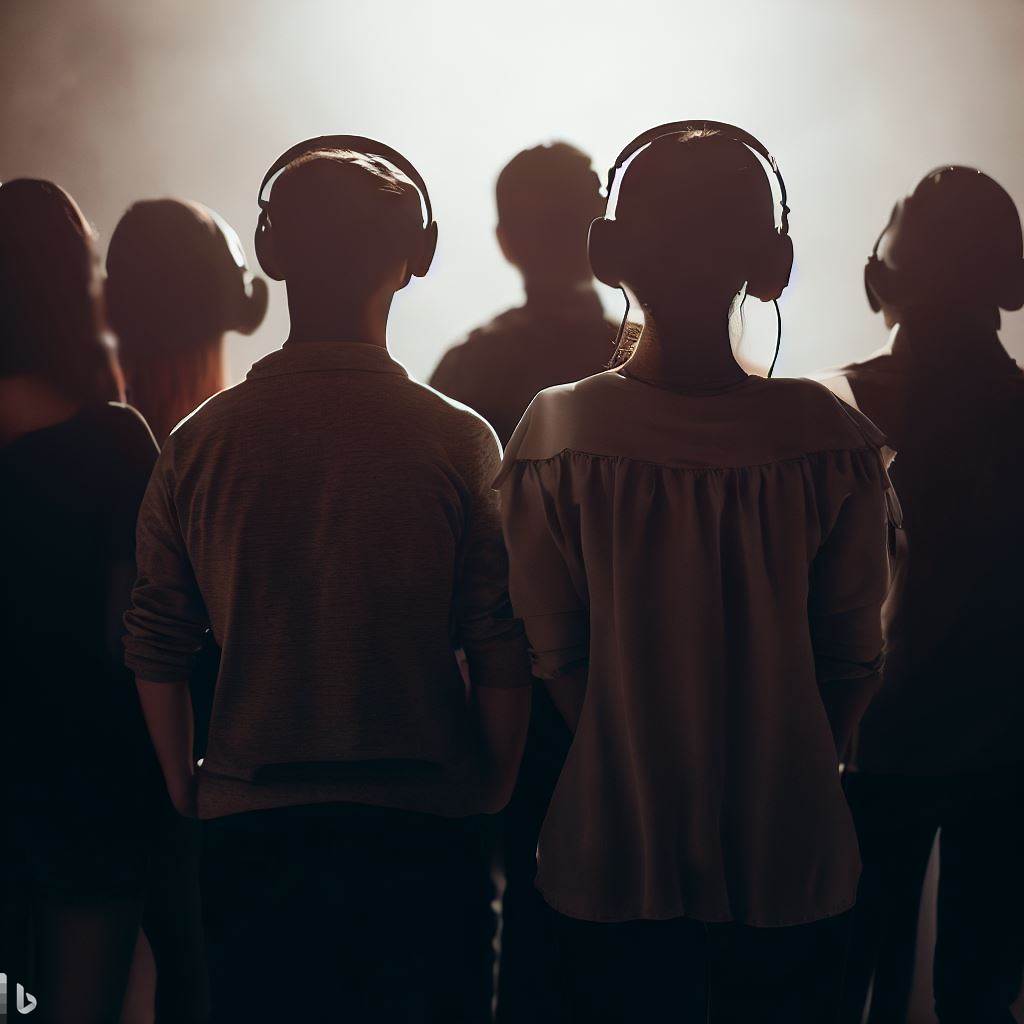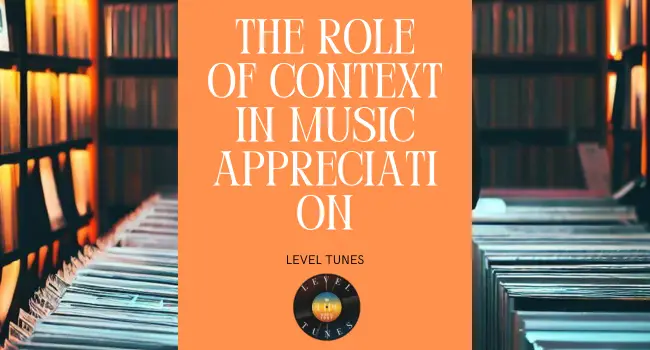The Role Of Context In Music Appreciation: Understanding Why Some Songs Make It To ‘Best’ Lists
As a music expert, I am often asked why certain songs make it to ‘best’ lists while others are overlooked. While there may be many factors at play, the role of context cannot be underestimated in determining how we perceive and appreciate music.
Context refers to the circumstances surrounding the creation and reception of a piece of music. This can include everything from historical events, cultural trends, personal experiences, and even the physical environment in which the music is heard.
By understanding these contextual factors, we can gain a deeper appreciation for why some songs resonate with us more than others and why they continue to stand the test of time.
In this article, we will explore the importance of context in shaping our musical tastes and offer insights into what makes certain songs truly great.
Table of Contents

The Power Of Context In Music Perception
When we listen to music, our perception of it is heavily influenced by its context. The cultural and historical significance of a song can shape how we interpret its lyrics and melody.
For example, a protest anthem from the 1960s may resonate differently with listeners today compared to when it was first released. Our understanding of the social movements and political climate during that time period informs our appreciation for the song’s message.
Genre expectations also play a significant role in how we experience music. When listening to a particular genre such as hip-hop or country, there are certain musical conventions that we expect to hear. Deviating too far from these norms can either be seen as innovative or disappointing depending on the listener’s preferences.
Production quality also influences our perception of a song – is it polished and refined, or raw and unpolished? These factors all contribute to the musical context in which songs exist, ultimately shaping our overall enjoyment and interpretation of them.
The Influence Of Time Period On Musical Reception
Understanding the influence of time period on musical reception is crucial to fully appreciate why certain songs make it onto ‘best’ lists.
Historical context plays a significant role in shaping music trends and cultural shifts, which ultimately affect how audiences perceive musical compositions. For instance, during the 1960s, political unrest and social upheaval led to an emergence of protest folk songs that reflected the sentiments of the youth at the time.
Technological advancements also play a part in shaping musical tastes. The advent of MTV in the 1980s brought about a shift towards visual aesthetics in music videos while also democratizing access to popular music from around the world through cable television.
Therefore, understanding historical events, cultural shifts, technological advances and their impact on musical styles can give insight into why some pieces stand out more than others. It can help listeners contextualize their experiences with music and gain deeper appreciation for its significance beyond just entertainment value.
Personal Experiences And Emotional Associations
As we have previously discussed, the reception of music is heavily influenced by the time period in which it was created. However, personal experiences and emotional associations also play a significant role in how an individual connects with a particular song or artist.
Nostalgic connections to memories from different periods of one’s life can greatly impact musical appreciation. The significance of personal memories and mood association cannot be understated.
The way that individuals interpret lyrics and melodies is unique to their own experiences, making each person’s connection to a piece of music completely individualized. For example, a song may be popular due to its catchy beat but for someone who associates that song with a difficult time in their life, they may not find enjoyment in listening to it.
Therefore, contextual significance extends beyond just cultural and historical context but also includes personal context as well.

Sociocultural Factors In Music Appreciation
When we listen to music, we are not just experiencing the sound waves that our ears pick up. We are also immersed in a complex web of sociocultural factors that influence how we understand and appreciate different genres, artists, and songs.
One important factor is cultural influences – the ways in which music reflects and shapes the values, beliefs, customs, and traditions of different communities around the world. For example, certain types of music may be associated with particular religious or spiritual practices (such as gospel or qawwali), political movements (such as protest songs or hip-hop), ethnic identities (such as mariachi or reggae), or national cultures (such as opera or country).
These associations can give rise to strong interpersonal connections between musicians and their audiences, who share common experiences, emotions, struggles, joys, and aspirations through music. Moreover, historical relevance plays a key role in determining what makes it onto ‘best’ lists’.
The impact of language on lyrics cannot go unnoticed either; linguistic impact has had significant impacts on popular culture across all regions globally. Finally, geographical significance would play an integral part in appreciating some forms of music because where you come from ultimately shapes your preferences for specific sounds.
Exploring The Complexities Of Music Taste
As we explored in the previous section, sociocultural factors play a significant role in shaping our music appreciation. However, it is important to note that musical subjectivity also plays an essential part in determining why some songs make it to ‘best’ lists.
While there may be objective criteria such as technical proficiency and critical acclaim used to evaluate music, ultimately, what makes one person’s heart sing might not do the same for another.
Genre preferences are an example of how individuality influences music taste. Some people may gravitate towards hip-hop or pop while others prefer classical or country.
Nostalgic bias can also come into play when evaluating music; a song that evokes fond memories from childhood may hold more significance than objectively superior works.
Cognitive dissonance is yet another factor – sometimes listeners find themselves enjoying songs with lyrics or messages that contradict their beliefs or values.
In this way, personal experiences and biases shape how we engage with and interpret music.
Frequently Asked Questions
How Does Genre Affect The Role Of Context In Music Appreciation?
When it comes to music appreciation, genre preferences play a significant role in how contextual interpretation affects our listening experience.
Cultural influences can also shape our emotional resonance with different types of music.
For example, someone who grew up listening to classical music might have a deeper understanding and appreciation for the historical significance behind certain pieces than someone who primarily listens to mainstream pop songs.
Moreover, the emotional impact that a song has on an individual is subjective and can be influenced by personal experiences and memories associated with the genre or specific artist.
Therefore, when discussing the role of context in music appreciation, it’s essential to consider how genre affects our perception of a song’s cultural relevance and emotional power.
Do Different Cultures Have Different Contexts For Music Appreciation?
Musical diversity is an inherent aspect of cultural influence, as each society has its own unique musical traditions that reflect their values and beliefs.
This can lead to a perception variance when it comes to music appreciation, where different cultures may assign differing levels of historical significance or emotional connection to certain songs or genres.
As a music appreciation expert/writer, I find this topic fascinating because it highlights the importance of understanding how our backgrounds shape our musical preferences.
By exploring these cultural contexts, we can gain a deeper appreciation for the nuances behind some of the world’s most beloved songs.
How Do Technological Advancements Impact The Context Of Music Appreciation?
Technological advancements have had a significant impact on the way people appreciate music.
With the influence of streaming and AI, listeners are exposed to an unprecedented variety of tunes from different parts of the world.
The evolution of production has also led to innovative sounds that push the boundaries of creativity.
Furthermore, virtual reality experiences offer fans immersive concerts without leaving their homes, addressing accessibility concerns for those who cannot attend live events.
Social media platforms provide a space for artists to connect with their followers in real-time, creating intimate relationships between musicians and fans.
As technology continues to shape our musical landscape, it is essential to consider how these changes affect our understanding and appreciation of music.
Are There Any Physiological Factors That Contribute To The Role Of Context In Music Perception?
Music has always been a powerful tool for evoking emotions, and recent studies have delved deeper into understanding the physiological factors that contribute to music perception.
Brain activity plays a crucial role in how we experience music, as different areas of our brain light up depending on the type of music we listen to.
Cultural differences also come into play, with certain genres or types of instruments resonating more strongly with specific populations.
Mood influence is another significant factor – it’s no surprise that sad songs are often played during times of heartbreak or loss.
But did you know that physical environment can also impact our enjoyment of music? The acoustics of a room or outdoor space can greatly affect the way we perceive sound.
By exploring these various aspects of music appreciation, we can gain a greater understanding of why certain songs make it onto ‘best’ lists and connect with listeners on an even deeper level.
Can The Same Song Have Different Contexts For Different Listeners?
Individual interpretation plays a crucial role in music appreciation.
The same song can have different contexts for different listeners, depending on their emotional connection, personal experiences, cultural background, and social context.
For instance, someone who associates a particular melody with a past relationship may find it painful to listen to that song again.
On the other hand, someone from a different culture may find that same melody fascinating because of its unique rhythms or instrumentation.
As such, understanding how individual interpretation contributes to our experience of music is vital if we are to appreciate why some songs make it to ‘best’ lists.
All in All
As a music appreciation expert, it is clear that context plays a vital role in how we perceive and appreciate songs. The genre of a song can greatly impact the context of its lyrics and instrumentation, influencing our emotional response to the piece.
Additionally, cultural backgrounds can also shape our understanding and interpretation of music. Technological advancements have created new contexts for music appreciation, allowing us access to an endless array of genres and styles from around the world.
However, physiological factors such as age and personal experiences also contribute to how we perceive music. It is important to recognize that the same song can hold different meanings and emotions for different listeners based on their unique contexts.
In conclusion, understanding the role of context in music appreciation allows us to better appreciate and connect with the songs we love. As we continue to evolve technologically and culturally, it will be interesting to see how our perceptions of music change over time.
But one thing remains constant: great songs will always find ways to resonate with people across all contexts.
Thanks for reading.
TBone




